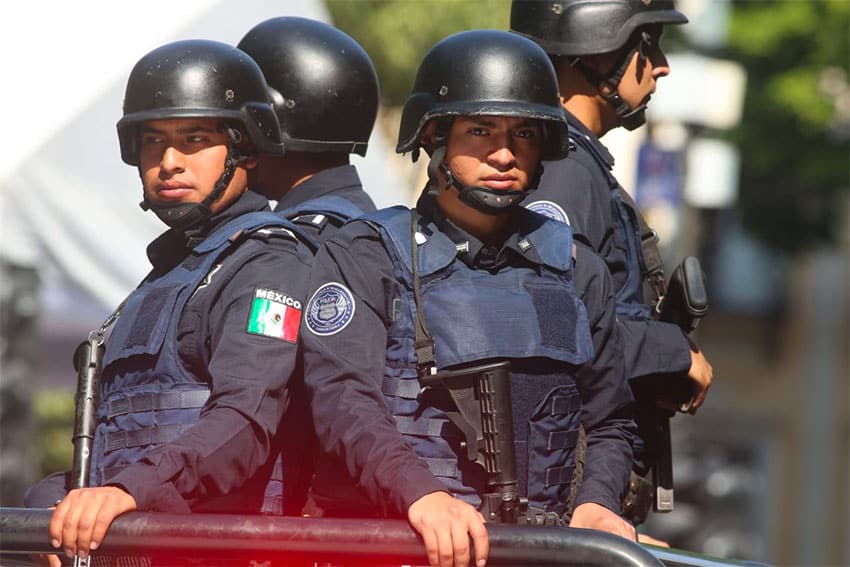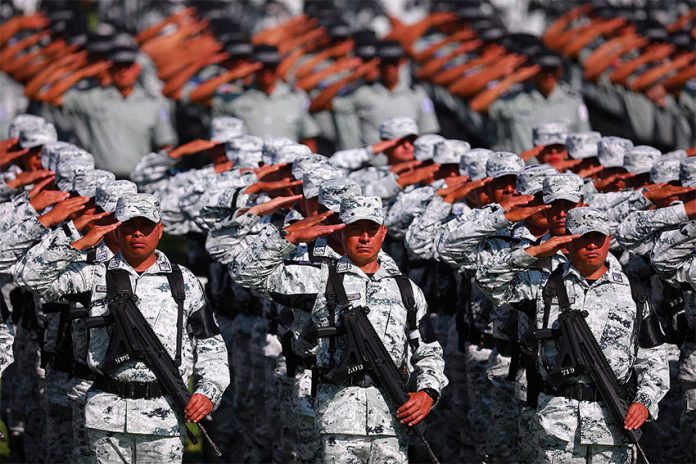Almost half of Mexico’s municipal and state police officers are not officially certified as required by the law and shouldn’t be working while the numbers are even worse at the federal level.
The National Security Council granted an 18-month extension in July 2019 for the certification of police officers after it was deemed that the original three-year period was insufficient.
The term of the extension ended Wednesday, according to information obtained by the news website Animal Político, but 46% of police officers at the municipal and state levels are still not properly accredited.
National Public Security System data shows that there are 305,231 municipal and state officers but only 164,534 have been certified.
That leaves 140,697 police without certification, a status that is intended to show that they are trustworthy, competent, physically able to carry out their job, meet performance standards, have undertaken initial training, don’t take drugs, don’t have a criminal record and have no links to organized crime.
Querétaro stands out as the only state in the country to have certified all of its municipal, state and ministerial police, while Campeche, Coahuila and Durango have certification rates between 80% and 90%, Animal Político reported. The other 28 states all have rates below 80%.
Guerrero ranks last with just 26.4% of its police certified while the rate in Baja California Sur is only slightly better at 30.7%.
Veracruz, Tlaxcala, Yucatán, Zacatecas and Hidalgo all have rates below 40%, while just over half of the officers in the Mexico City police force are certified.
While one might expect the federal government to set a good example to the states and municipalities by ensuring that members of its security forces are certified, its own rates are in fact worse.
Just 12.2% of 5,352 federal agents attached to the federal Attorney General’s Office are certified while only 9.6% of just over 88,000 National Guard members have the paperwork to prove they’re fit to be in the force. Some former military members transferred into the National Guard lack the basic training to work in the civilian force, according to an analysis by the Federal Auditor’s Office.
The 2019 law that authorized the creation of the National Guard, which effectively replaced the Federal Police, stipulates that all members must be certified within two years. That period expires on May 27, meaning that the force has about 2 1/2 months to certify about 80,000 guardsmen.

Mayra Hernández, a public security expert, told Animal Político that a range of factors have contributed to the low certification rates. She said the process has never been a budget priority, noting that less than 20% of federal funds allocated to state and municipal police forces has been been designated for certification.
Far more money has gone to the purchase of police equipment and materials, she said.
The lack of a consistent certification strategy has also contributed to the national failure rate, according to the security expert. Hernández said that states have provided reports to federal authorities about their progress in certifying officers, but they contain imprecise information and no one really reviews them.
Hernández added that police certification has been tainted by corruption, explaining that many officers have had to pay their superiors for access to the evaluation process to ensure that they can keep their jobs.
“Police who earn 10,000 pesos [US $485] a month have had to pay up to 55,000 pesos [US $2,670] to be evaluated. [The authorities] will have to look closely at that so that … [certification] doesn’t end up being a business,” she said.
The coronavirus pandemic has also affected the results, according to authorities, because some officers belong to vulnerable sections of society and haven’t been able to complete the process due to the risk of infection.
Given the large number of uncertified officers, the National Security Council should grant another extension so that “illegal officers” are not patrolling Mexico’s streets, Hernández said. Federal officials consulted by Animal Político said that another extension will likely be granted, possibly as soon as this week.
“It has to be an extension with greater joint responsibility,” Hernández said.
“The states and the municipalities should report punctually every month about their progress … in order to comply with certification within a maximum of one year,” the expert said, adding that funding for the process must be increased.
Source: Animal Político (sp)
